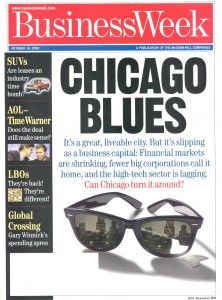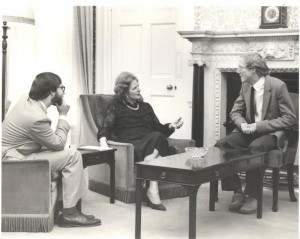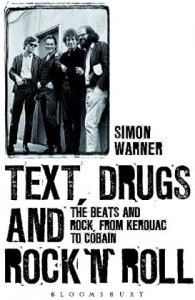 Nearly 13 years ago, my editor at BusinessWeek warned me to put on my combat helmet when a cover story by a group of us in the Chicago bureau hit the streets. The piece, “Chicago Blues,” reported that the city was slipping as a business capital. We discussed how its financial markets were shrinking, it was losing corporate headquarters, high-tech entrepreneurs were making tracks for the Coast and the toddlin’ town wasn’t even really The Second City anymore — LA stole that ranking as it became a magnet for Midwesterners and others looking to live in a place on the rise.
Nearly 13 years ago, my editor at BusinessWeek warned me to put on my combat helmet when a cover story by a group of us in the Chicago bureau hit the streets. The piece, “Chicago Blues,” reported that the city was slipping as a business capital. We discussed how its financial markets were shrinking, it was losing corporate headquarters, high-tech entrepreneurs were making tracks for the Coast and the toddlin’ town wasn’t even really The Second City anymore — LA stole that ranking as it became a magnet for Midwesterners and others looking to live in a place on the rise.
All of it was true. And reading about all of it, editor Steve Shepard knew, would really tick off people in Chicago.
Now, it’s Rachel Shteir and the editors at the New York Times Book Review who have found — probably to their dismay — that it’s their turn to get out the flak jackets. Shteir, a New Jersey-born professor at Chicago’s DePaul University, lit into the Windy City in a front-page essay for a long list of all-too-unsettling truths. Fifteen-year-olds shot near President Obama’s home, racial segregation, financial strain, corrupt politicians — all of it masked by a boastful swagger about how NYC and other spots can’t hold a candle to the city by the lake.
As we did in 2000, Shteir is finding that Chicagoans don’t take kindly to national publications — especially New York-based ones — saying nasty things about their city. The outpouring of venom directed at her is stunning — “clueless,” “a vampire,” “elitist,” “mean-spirited,” “a poor, sad woman,” “maladapted,” “a disingenous shithead” and worse. And these were among the more civil comments posted in response to a Chicagomag.com piece, “Rachel Shteir Defends Her Anti-Chicago Essay in a Rare Q&A” by Carol Felsenthal.
The vileness of the responses is far worse than what we encountered, probably because people now feel untethered by any sense of civility when they’re sounding off on the Net. Coarseness and abuse are the order of the day, it seems. But the passion, defensiveness and unwillingness to brook any criticism is all too familiar. It’s a replay of what we ran into — honest, open and full discussion? Fuggedaboutit! Critical self-examination? Don’t bug me, a—-le!
 In fairness, we had some good thrust-and-parry discussions involving smart people. WTTW invited a colleague and coauthor of the piece, Roger Crockett, and me, onto “Chicago Tonight” to face off against Paul O’Connor of World Business Chicago and the Chicagoland Chamber of Commerce’s Jerry Roeper. Sure, we argued, but we all behaved like gentlemen, mostly. Indeed, Shteir appeared on the station with Phil Ponce to explain her criticisms, proving that the folks at WTTW have a lot of class. At a couple commercial stations, I’ve read, the hosts vented their outrage, but didn’t share the stage with Shteir (I don’t know if they invited her on or not).
In fairness, we had some good thrust-and-parry discussions involving smart people. WTTW invited a colleague and coauthor of the piece, Roger Crockett, and me, onto “Chicago Tonight” to face off against Paul O’Connor of World Business Chicago and the Chicagoland Chamber of Commerce’s Jerry Roeper. Sure, we argued, but we all behaved like gentlemen, mostly. Indeed, Shteir appeared on the station with Phil Ponce to explain her criticisms, proving that the folks at WTTW have a lot of class. At a couple commercial stations, I’ve read, the hosts vented their outrage, but didn’t share the stage with Shteir (I don’t know if they invited her on or not).
But back in the BW storm, we also got blindsided. Some economic heavyweights staged a panel discussion at the Chicago Fed, as I recall, to explore Chicago’s economic health. But it was anything but a full and balanced discussion. It was more a highbrow ambush with nary a negative word to be heard. One would have thought Chicago was Edenic. The folks there didn’t bother asking me or anyone from BW to join them on the dais to make our case, but rather were happy to hold forth as if our arguments weren’t worth the trouble. Instead, they just ignored the data we had mustered and focused on things such as how bad traffic was, a sure sign of health, as I recall economist Diane Swonk arguing. Swonk in fact had a point about traffic, but what did that have to do with the losses of corporate headquarters, the inability of Sears to innovate and the fiery arguments at the Chicago futures exchanges about whether to modernize to try to catch up to European rivals?
As Shteir is finding, boosters will just change the grounds of the argument when uncomfortable truths don’t suit them. Can’t win the fight on your opponent’s terms? Just change the terms. Sadly, the ugly truths don’t go away. And the social problems Shteir is talking about — the crime, corruption and growing number of murders — seem to be moving even into better neighborhoods now. Check out the problems in Old Town with gangs on DNAinfo.comChicago, if you doubt that.
 Shteir got under the skin of Mayor Rahm Emanuel with her polemic. His response: “Meet the people. Meet our neighborhoods. We have a lot to offer, which is why we’re a world-class city,” according to Felsenthal. That kind of shallow boosterism echoed what we heard from Mayor Daley. Not satisfied with a Q&A with him that we ran with the BW piece, Daley responded with a long letter that ended with “Life is good in Chicago, and it’s only going to get better.” Tragically, the gang violence and the continuing tragedy that is the Chicago school system both suggest otherwise.
Shteir got under the skin of Mayor Rahm Emanuel with her polemic. His response: “Meet the people. Meet our neighborhoods. We have a lot to offer, which is why we’re a world-class city,” according to Felsenthal. That kind of shallow boosterism echoed what we heard from Mayor Daley. Not satisfied with a Q&A with him that we ran with the BW piece, Daley responded with a long letter that ended with “Life is good in Chicago, and it’s only going to get better.” Tragically, the gang violence and the continuing tragedy that is the Chicago school system both suggest otherwise.
Felsenthal goes over much of this ground in a couple posts in her blog in Chicagomag.com. Both the posts and the comments are worth a glance.
For my money, Shteir’s broadside doesn’t say enough about the many wondrous things about Chicago. The lakefront is unmatched. Michigan Avenue is a treasure. Neighborhoods, especially on the north side, are charming and liveable. New York, by contrast, is too crowded and just too much. The Cubs are great fun, though it would be nice if they won more often. The city has great art, great music, great culture, delightful restaurants. And, despite the invective hurled at Shteir, it has some great people.
But all that is at risk if Chicago can’t solve its corrosive problems, and the first step is facing up to them, not facing down the messenger. We wrote a lot in the BW piece about the shortcomings of the futures exchanges but, since then, those folks got their act together (we cannot take credit for that. I’m sure it was more a matter of dollars and common sense). They merged the Board of Trade and the Merc to form a global titan, CME Group. Bravo! Sadly, the city’s banking community is now mostly a ward of distant banking giants. Outfits that were once the pride of Chicago, such as Sears, are now pathetic shells. I wonder what we would find if we looked anew at the city’s business health (Note to the Bloomberg Businessweek bureau: take a look).
Chicago, to be sure, is not soon to become another Detroit, as Shteir suggests. It doesn’t depend on a sole industry that can suffer a near-death experience and take a city down with it. But will it look more like Detroit in, say, 25 years than it does today? That turns in part on whether the city can solve the problems people like Shteir have the guts to bring up, no matter what abuse they suffer for doing that.



